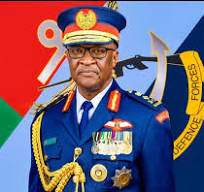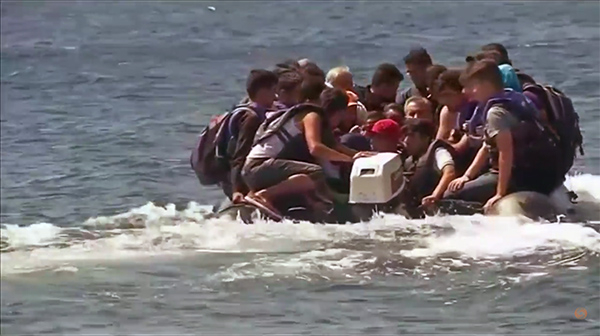The brutal gang rape of a woman by three Afghan asylum seekers in central Vienna on April 22 has shocked the Austrian public and drawn attention to a spike in migrant-related rapes, sexual assaults and other crimes across the country.
The migrant crime wave comes as the anti-immigrant Freedom Party of Austria (FPÖ) has surged in opinion polls. The party’s candidate, Norbert Hofer, won the first round of Austria’s presidential elections on April 24, and is on track to win the presidency in the second round, run-off election scheduled for May 22.
The three Afghans — two 16-year-olds and one 17-year-old — followed the woman, a 21-year-old exchange student, into a public restroom at the Praterstern train station, one of the main transportation hubs in Vienna. One of the migrants held the woman down while the other two took turns raping her.
A passerby called the police after she heard the woman screaming. By the time police arrived, the men had gone. The suspects, who were arrested as they were attempting to flee the station, do not speak German. Through an interpreter, the migrants told police they were drunk and do not remember carrying out the crime.
If convicted, they face a maximum sentence of seven-and-a-half years in prison. Due to the lenient nature of the Austrian judicial system, however, they may end up spending only two years behind bars, according to local observers.
It is also unlikely that the migrants will be deported: according to European law, sending them back to Afghanistan would be a violation of their human rights. Instead, observers say, the Afghans will qualify for Austrian social welfare benefits — €830 ($950) per month plus free healthcare — and probably for the rest of their lives become wards of Austrian state.
The assault in Praterstern is one of a growing number of migrant sex crimes in Austria (other migrant rapes and sexual assaults are included in the appendix below):
- A 20-year-old asylum seeker from Iraq confessed to raping a 10-year-old boy at a public swimming pool in Vienna. The Iraqi said the rape was a “sexual emergency” resulting from “excess sexual energy.” The man, who left his wife and child behind in Iraq, said he had been unable to control his libido because he had not had sexual relations since arriving in Austria in September.
- An 18-year-old asylum seeker from Afghanistan was sentenced to 20 months in prison for raping a 72-year-old woman in Traiskirchen. “First he beat the woman black and blue, then he raped her, and then he took her underwear as a trophy,” local police said. In addition to a lenient sentence, the man will be allowed to remain in Austria and, after he leaves prison, collect social welfare benefits.
- A 20-year-old asylum seeker from Afghanistan was arrested after he coerced 13-year-old girl from the town of Korneuburg repeatedly to have sex with him. The man, who was living in an asylum shelter in Hollabrunn, first established contact with the girl over the Internet. Each time they met in person, he verbally threatened her until she agreed to have sex. The man was arrested after the girl told her parents about the relationship, which had been going on for more than three months.
- Mobs of Arab migrants sexually assaulted dozens of women in Vienna, Salzburg and Innsbruck on New Year’s Eve. The sex attacks, known in Arabic as taharrush (“harassment”), were similar to those carried out that day by North African migrants in Cologne, Germany and other cities. Police initially denied that the attacks had taken place, but later admitted to lying, purportedly to protect the privacy of the victims.
Those who dare to link spiraling crime to Muslim mass migration are being silenced by the guardians of Austrian multiculturalism.
In April, for example, the Austrian Press Council (Presserat) — a group that enforces a politically correct “code of ethics” to ensure that Austrian media outlets toe the line of state-sanctioned multiculturalism — censured the left-leaning magazine, Falter, for “blanket discrimination” against Muslims.
The magazine’s editors — otherwise faithful proponents of European multiculturalism — appear to have had enough of migrants raping their way through Europe with virtual impunity. For the January-February 2016 edition, Falter’s cover featured a black and white drawing of five “light skinned” European women surrounded by large numbers of “dark skinned” Arab males. The image evoked images of the taharrush assaults in Cologne.
In a three-page “decision,” the Presserat ruled that the image violates the “code of ethics” because it amounts to “blanket slander and discrimination” against Arab men:
“The men are all portrayed with the same fierce-looking facial expression, dark hair and noticeably dark eyebrows. In this way — in the context of the attacks in Cologne — the artist is constructing a prototype of men from North Africa, i.e., the Arab world. The uniformity of the image suggests that, rather than portraying individuals, it depicts a homogenous group whose members all behave in the same way.
“Therefore, readers could be left with the impression that the sexual assaults in Cologne were not the acts of individual persons or person groups, but that such conduct is typical for men from North Africa, i.e., the Arab world. The image could leave the impression that all North Africa men who are here in Europe fail to conduct themselves correctly vis-à-vis women.”
The editors of Falter defended themselves against accusations of racism:
“The fact is that North Africans were overwhelmingly responsible for the assaults in Cologne. This is what took place and we should be allowed to represent it as such.”
Vienna is the epicenter of migrant crime in Austria. According to data compiled by the Austrian Interior Ministry, nearly one out of three asylum seekers in Vienna was accused of crimes in 2015. Of the nearly 21,000 officially approved asylum seekers in the capital, 6,503 were known to have committed crimes in 2015, a jump of nearly 50% over 2014. The data shows that 2,270 of the criminals were under the age of 20, a 72% jump over 2014. Seven were under age nine, while 31 were under age 13.
According to Vienna Police Chief Gerhard Pürstl, North African gangs fighting for control over drug trafficking were responsible for roughly half of the 15,828 violent crimes — rapes, robberies, stabbings and assaults — reported in the city during 2015.
The area around the Praterstern station, where the exchange student was raped, has become overrun by shiftless migrants from Afghanistan and North Africa who are selling drugs, fighting turf battles and assaulting female passersby. Police were dispatched to the area a total of 6,265 times in 2015, or an average of 17 times a day, according to local media. But local authorities appear unable or unwilling to restore order to the area.

The area around Praterstern train station in Vienna is overrun by shiftless migrants from Afghanistan and North Africa who are selling drugs, fighting turf battles and assaulting female passersby. Police were dispatched to the area 6,265 times in 2015. |
The head of the Austrian Police Union, Hermann Greylinger, estimates that Vienna needs around 1,200 more police officers in order to establish order in the capital:
“If we are allowing in our country 111,000 migrants, few of whom have had background checks, then clearly the police must be massively increased. Almost all asylum claimants are moving to Vienna. We now have more migrants than the population of the city of Salzburg, the fourth-largest city in Austria.”
Austria’s migrant crime problem is being exacerbated by an extremely lenient criminal justice system. On May 4, for example, a 21-year-old migrant from Kenya randomly killed a 54-year-old woman on a busy street in Vienna by hitting her over the head with an iron bar. It soon emerged that the Kenyan was well known to city police: since arriving in Austria in 2008, he had committed at least 18 previous crimes — including dealing drugs, attacking police officers and hitting someone over the head with an iron bar — but he has repeatedly been set free.
Given the growing insecurity, it comes as no surprise that Austrian voters are looking for a change in political direction.
In what amounts to a political earthquake, Freedom Party (FPÖ) candidate Norbert Hofer won 36% of the vote in the first round of Austria’s presidential election on April 24. Hofer — who has campaigned on a platform calling for strict limits on immigration and tough rules for asylum seekers — defeated all of the other candidates, including those from the two governing parties, the Social Democrats and the Austrian People’s Party, which have dominated Austrian politics since the end of World War II.
Hofer, who says that as president he will be the “protector of Austria,” is now on track to defeat the Green Party’s Alexander Van der Bellen, a 72-year-old economist who is opposed to limits on immigration, in a run-off ballot to be held on May 22.
Hofer’s meteoric rise is focusing the minds of the establishment parties. On April 27, just three days after Hofer’s electoral victory, the Austrian Parliament adopted what may be one of the toughest asylum laws in Europe.
Under the new law, Austria will declare a “state of emergency” on the migration crisis. This will allow Austrian authorities to assess asylum claims directly at the border. Only asylum seekers with immediate family members already in Austria, or those who can prove they are in danger in neighboring transit countries, will be allowed to enter the country. Other migrants will be turned away. The new law also limits any successful asylum claim to three years.
Interior Minister Wolfgang Sobotka said the new law is needed to stem the flow of migrants and refugees: “We cannot shoulder the whole world’s burden.”
Austria received 90,000 asylum requests in 2015, the second-highest number in the European Union on a per capita basis, but this pales in comparison to what may lie ahead. In a radio interview on April 28, Sobotka warned that up to one million migrants are poised to cross the Mediterranean Sea from Libya to Europe.
Soeren Kern is a Senior Fellow at the New York-based Gatestone Institute. He is also Senior Fellow for European Politics at the Madrid-based Grupo de Estudios Estratégicos / Strategic Studies Group. Follow him on Facebook and on Twitter. His first book, Global Fire, will be out in 2016.
Appendix
Sexual Assaults and Rapes by Migrants in Austria, January-April 2016.
Gatestone Institute has reported about the migrant rape epidemic in Germany and Sweden. The problem has now spread to Austria. Following are a few cases from the first four months of 2016:
April 29. A 35-year-old migrant from Algeria attempted to rape a woman at a bus stop in Linz. The man beat the woman unconscious, but not before she broke his nose. He was arrested after he went to a local hospital seeking medical attention. It later emerged that the Algerian has a long criminal record, including other attempted rapes, but cannot be deported because Algeria will not take him back.
On April 25, Kronen Zeitung, the largest newspaper in Austria, reported that an “Arabic-looking man” attempted to rape a 27-year-old woman at a bus stop in Vienna. “All he could say was sex, sex, sex,” the woman said. The man pulled a condom out of his pants pocket and then dropped his trousers. “I screamed as loud as I could,” the woman said, “until the man ran away.” She said that city police have been wholly uninterested in her case: “They have not even asked me for my name.” After local media reported on her case, police issued an apology and blamed their failure to take her seriously on a “regrettable misunderstanding.”
April 24. An unidentified migrant raped a 19-year-old woman in Eisenstadt.
April 22. Three asylum seekers from Afghanistan gang-raped a 21-year-old woman at a train station in Vienna.
April 22. A 17-year-old asylum seeker from Afghanistan attempted to rape a 20-year-old woman in Graz.
April 21. A 17-year-old asylum seeker from Afghanistan sexually assaulted a 19-year-old woman on a train in Grieskirchen. The train’s conductor intervened after he heard the woman scream. The Afghan told police that the woman was lying and demanded an apology.
April 20. Two North African migrants sexually assaulted a woman in front of the main train station in Salzburg. When a 26-year-old passerby attempted to intervene, the migrants punched and kicked him so hard that he was rushed to a nearby hospital. One of the attackers is a 31-year-old asylum seeker from Morocco. The other suspect remains at large.
April 15. A 42-year-old migrant from Slovenia was arrested for attempting to sexually assault two 18-year-old women in Leibnitz.
April 13. An “Arab looking” man sexually assaulted three women at a bus stop in Vienna.
March 24. Two Afghan migrants were arrested for raping a 20-year-old woman in Wels.
March 21. A migrant from North Africa assaulted a 27-year-old woman on a packed subway train in Vienna. The man began touching the woman on her hands. When she got up to find another seat, the man grabbed her and began kissing her on the mouth. Police told the woman there was nothing they could do because kissing does not qualify as sexual assault.
March 12. A 16-year-old asylum seeker from Libya attempted to kidnap and rape two women in Vienna. After the three met on a subway train, the Libyan promised to take the women to a nightclub. He took them instead to an apartment where he attempted to lock the women in the basement and rape them. One of the women escaped and called the police.
March 8. A 20-year-old asylum seeker from Afghanistan was observed pointing to his genitals in front of a seven-year-old girl at a public swimming pool in Vienna. The pool director and a swimming instructor held the man until police arrived. The police let him go.
March 6. A “foreign looking” man sexually assaulted a 37-year-old woman at a public swimming pool in Klagenfurt after she intervened to prevent him from molesting her four-year-old boy.
February 25. A “southerner” sexually assaulted two teenage girls at a shopping mall in Innsbruck.
February 22. An 18-year-old migrant from Afghanistan was arrested for raping a 52-year-old woman in Innsbruck.
February 14. Six migrants sexually assaulted a 49-year-old woman on a subway in Vienna. Two of the men, an 18-year-old asylum seeker from Afghanistan and a 23-year-old asylum seeker from Iraq, were arrested as they tried to exit the station. The other four remain at large.
February 11. A 33-year-old migrant from Iran masturbated in front of female patrons at a public swimming pool in Linz.
February 8. A 22-year-old migrant from Macedonia identified only as Ibrahim J. was arrested in Vienna for sexually assaulting more than 20 women in Vienna and other parts of Austria. Among other crimes, the man is accused of raping a 15-year-old girl.
February 6. A group of 28 male asylum seekers sexually harassed female patrons at an outdoor ice skating rink in Stockerau. The migrants then attacked security guards who tried to intervene. Police were needed to restore order.
February 4. Six “southerners” assaulted a 53-year-old woman in front of a grocery store in Spittal after she refused to give them money.
February 3. Three migrants sexually assaulted a 16-year-old girl at a streetcar stop in Leonding. One of the men held the girl down while the other two took turns assaulting her.
January 26. A 24-year-old asylum seeker from Gambia raped and murdered a 25-year-old American woman in Vienna. The woman from Colorado, who was working as an au pair (nanny), had given the man, Abdou I., shelter in her apartment. He had fled his asylum shelter because his asylum request was denied and he feared being deported. After the murder, the man fled to Switzerland, where he was arrested after police traced his cellphone. It later emerged that he was wanted in Germany for sexually assaulting an underage girl.
January 23. A migrant from Macedonia attempted to rape a 21-year-old woman in Vienna. The man made eye contact with the woman on a subway and followed her after she got off the train.
January 16. A 21-year-old asylum seeker from Afghanistan raped an 18-year-old woman at the Prater, a large public park in Vienna.
January 10. A 29-year-old asylum seeker from Afghanistan tried to molest a six-year-old boy at a public swimming pool in Linz. The mother of the child said: “I noticed six migrants enter the building. Two of them sat down at the edge of the pool for children. One of them began stimulating his genitals while flirting with my youngest child.”
January 1. Mobs of Arab men sexually assaulted at least 24 women in Vienna, Salzburg and Innsbruck.






































